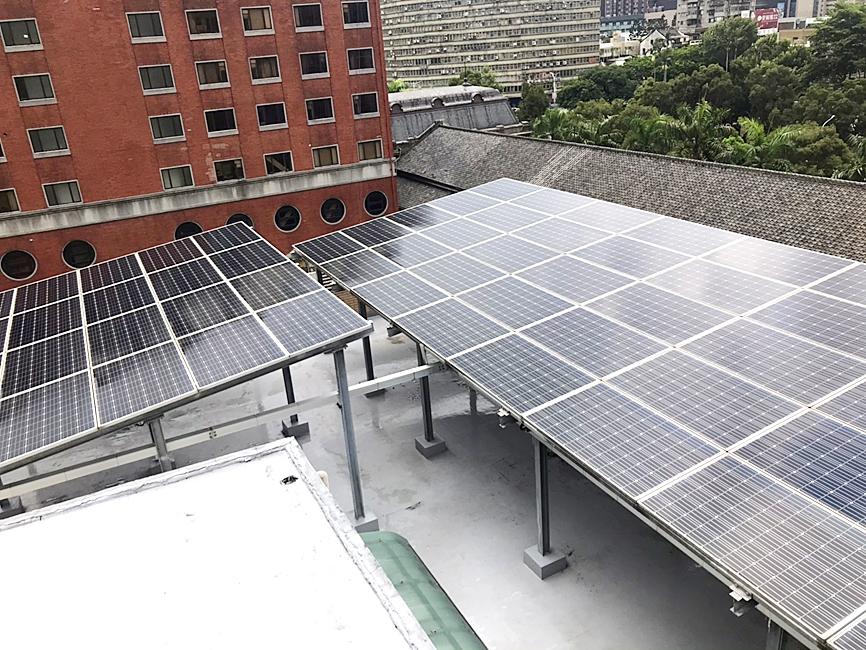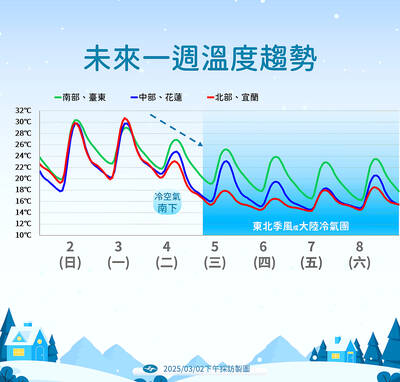A Republic of China (ROC) Military Academy project to install solar panels on its campus has reportedly been subcontracted to a company that is affiliated with China’s Huawei Technologies Co (華為), which was also found to have installed solar panels atop a building at the Legislative Yuan in Taipei, sparking concern over national security.
While the US and several European countries, as well as public agencies in Taiwan, have banned Huawei due to data security risks, the Chinese-language Apple Daily yesterday reported that it had received an anonymous tip that a construction project at the military academy in Kaohsiung has been subcontracted to New Green Power Co (永鑫能源), a distributor of power inverters manufactured by Huawei.
Although public bidding on the project in July last year was won by Cheng Yang Energy Co (承陽能源), it outsourced the project to New Green Power, sources said.

Photo: Peng Wan-hsin, Taipei Times
The report also said that arrays of solar panels on top of the Legislative Yuan’s Zhenjiang House (鎮江會館) on Zhenjiang Street are connected to an array of power inverters bearing “Green Power Co” and “Made in China” labels, as well as Huawei’s logo.
As power inverters have network functions, using Huawei’s inverters could allow Chinese hackers to interfere with Taiwan’s power supply, given that the rooftop solar panels would be connected to the grids owned by state-run Taiwan Power Co (Taipower, 台電), the nation’s sole electric utility, the sources said.
Changing the transmission frequency of the power inverters could disrupt the electricity grids, sending them into safety mode and triggering blackouts, they said.
Huawei devices might have backdoor software that transmits data — including on power generation and consumption — from power grids in Taiwan to China, lawmakers said.
Huawei is not just any Chinese company, but one with links to the Chinese People’s Liberation Army, so blocking the products is necessary against the backdrop of Chinese expansionism, not due to resentment against China, they said.
In response to lawmakers’ concerns, the Bureau of Energy and the Bureau of Standards, Metrology and Inspection agreed that Huawei products pose a data security risk, adding that the government would close any loopholes in regulations on the use of solar inverters at public facilities.
The Executive Yuan has demanded that all public entities comply with the Government Procurement Act (政府採購法), which states that products that could undermine national cybersecurity are banned, said a senior Cabinet official, who declined to be named.
No central government departments or agencies are using Huawei products, the source added.
The academy yesterday said that no contractors had come to the campus to carry out work, which is pending approval by the Kaohsiung City Government.
It would comply with the government’s information safety rules and not use Chinese products, it said.
Legislative Yuan Secretary-General Lin Chih-chia (林志嘉) yesterday said that he had ordered that the power inverters be promptly torn down, adding that Huawei products are strictly prohibited.
Additional reporting by CNA

SECURITY: The purpose for giving Hong Kong and Macau residents more lenient paths to permanent residency no longer applies due to China’s policies, a source said The government is considering removing an optional path to citizenship for residents from Hong Kong and Macau, and lengthening the terms for permanent residence eligibility, a source said yesterday. In a bid to prevent the Chinese Communist Party (CCP) from infiltrating Taiwan through immigration from Hong Kong and Macau, the government could amend immigration laws for residents of the territories who currently receive preferential treatment, an official familiar with the matter speaking on condition of anonymity said. The move was part of “national security-related legislative reform,” they added. Under the amendments, arrivals from the Chinese territories would have to reside in Taiwan for

CRITICAL MOVE: TSMC’s plan to invest another US$100 billion in US chipmaking would boost Taiwan’s competitive edge in the global market, the premier said The government would ensure that the most advanced chipmaking technology stays in Taiwan while assisting Taiwan Semiconductor Manufacturing Co (TSMC, 台積電) in investing overseas, the Presidential Office said yesterday. The statement follows a joint announcement by the world’s largest contract chipmaker and US President Donald Trump on Monday that TSMC would invest an additional US$100 billion over the next four years to expand its semiconductor manufacturing operations in the US, which would include construction of three new chip fabrication plants, two advanced packaging facilities, and a research and development center. The government knew about the deal in advance and would assist, Presidential

‘DANGEROUS GAME’: Legislative Yuan budget cuts have already become a point of discussion for Democrats and Republicans in Washington, Elbridge Colby said Taiwan’s fall to China “would be a disaster for American interests” and Taipei must raise defense spending to deter Beijing, US President Donald Trump’s pick to lead Pentagon policy, Elbridge Colby, said on Tuesday during his US Senate confirmation hearing. The nominee for US undersecretary of defense for policy told the Armed Services Committee that Washington needs to motivate Taiwan to avoid a conflict with China and that he is “profoundly disturbed” about its perceived reluctance to raise defense spending closer to 10 percent of GDP. Colby, a China hawk who also served in the Pentagon in Trump’s first team,

The arrival of a cold front tomorrow could plunge temperatures into the mid-teens, the Central Weather Administration (CWA) said. Temperatures yesterday rose to 28°C to 30°C in northern and eastern Taiwan, and 32°C to 33°C in central and southern Taiwan, CWA data showed. Similar but mostly cloudy weather is expected today, the CWA said. However, the arrival of a cold air mass tomorrow would cause a rapid drop in temperatures to 15°C cooler than the previous day’s highs. The cold front, which is expected to last through the weekend, would bring steady rainfall tomorrow, along with multiple waves of showers